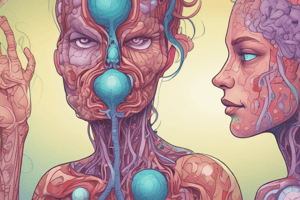Podcast
Questions and Answers
What is the primary function of hormones in the human body?
What is the primary function of hormones in the human body?
- To synthesize proteins and lipids
- To regulate various physiological processes (correct)
- To transmit nerve impulses
- To produce energy for the body
Which type of hormone is derived from cholesterol?
Which type of hormone is derived from cholesterol?
- Neurohormone
- Amine Hormone
- Steroid Hormone (correct)
- Peptide/Protein Hormone
What is the mechanism of action of steroid hormones?
What is the mechanism of action of steroid hormones?
- They inhibit the activity of enzymes involved in metabolic pathways
- They bind to receptors on the cell surface and trigger a signaling cascade
- They activate ion channels and change the membrane potential
- They bind to intracellular receptors and directly interact with DNA (correct)
Which of the following is NOT a characteristic of steroid hormones?
Which of the following is NOT a characteristic of steroid hormones?
What is the result of steroid hormones interacting with DNA?
What is the result of steroid hormones interacting with DNA?
Flashcards are hidden until you start studying
Study Notes
Hormones
- Hormones are chemical messengers produced by endocrine glands and secreted directly into the bloodstream.
- They travel to various organs and tissues to regulate physiological processes such as growth, metabolism, and reproduction.
Chemical Nature of Hormones
- Hormones can be categorized into three main types based on their chemical structure:
Steroid Hormones
- Steroid hormones are lipid-soluble molecules derived from cholesterol.
- They can easily pass through cell membranes due to their lipophilic nature.
- Examples: Cortisol, testosterone, estrogen, and progesterone.
- Mechanism of action: Steroid hormones bind to intracellular receptors, forming hormone-receptor complexes that directly interact with DNA to regulate gene expression.
- This process often involves altering the transcription of specific genes, leading to changes in protein synthesis and cell function.
Other Hormone Types
- Peptide/Protein Hormones
- Amine Hormones
Studying That Suits You
Use AI to generate personalized quizzes and flashcards to suit your learning preferences.



